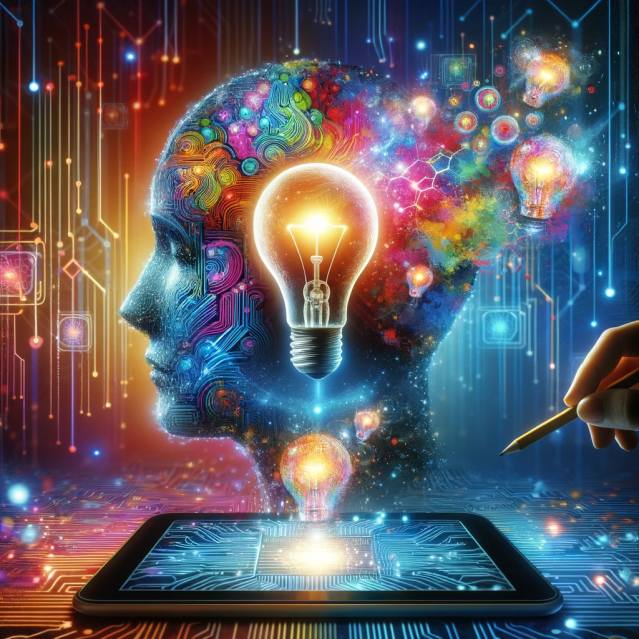Artificial Intelligence
Increase Your Creativity with Artificial Intelligence
9 ways AI can unlock your creativity in life and business.
Updated December 27, 2023 Reviewed by Monica Vilhauer
Key points
- AI can unlock greater creativity, inspiring new ideas that transcend traditional thinking.
- AI can boost creativity by blending data-based insights with new ideas.
- Many applications of AI already exist to foster creativity, from composing music to business marketing.
- When used creatively, AI can challenge limiting mindsets, broadening the horizons of the human mind.

In our fast-paced world, creativity isn't just a nice-to-have; it's a necessity both in personal life and in business. It's the engine driving innovation, problem-solving, and even personal fulfillment. In the business realm, creativity sets companies apart, fostering innovation and competitive advantage. On a personal level, it enriches our lives, helping us see the world in new ways and discover the most fulfilling ways to accomplish our goals.
Parallel to the growing importance of creativity is the rise of Artificial Intelligence (AI). Once a futuristic concept, AI is increasingly becoming part of our everyday lives, from the algorithms Netflix uses to suggest movies to how students conduct research at school.
So, what is the role of AI in fostering greater creativity for individuals, organizations, and society as a whole?
How AI Amplifies Creativity
Artificial Intelligence (AI) has the potential to deliver a unique blend of inspiration and insight to unlock new realms of creativity. At its core, AI serves as a catalyst for expanded thinking, challenging traditional constraints and assumptions of the human mind. By presenting data, patterns, associations, and possibilities that may not be immediately apparent, AI stimulates divergent thinking, a key psychological component of creativity. The ability to think in a non-linear, multidimensional manner can encourage individuals to explore beyond their usual cognitive biases and horizons, fostering innovative thinking and problem-solving.
A writer, for instance, might utilize an AI-driven storytelling assistant to explore plot twists or character developments that they wouldn't typically consider, leading to more dynamic and unpredictable narratives. For example, the writer might ask AI, "Can you create a plot twist for my story where the main character discovers they are visually impaired, and their nemesis is actually their disability that’s playing tricks on their reality?” By engaging with AI by asking unique and provocative questions, the creative possibilities that arise become seemingly limitless.
In addition, AI's capacity to process and analyze vast amounts of data transcends the limitations of human memory and information processing, effectively augmenting cognitive capabilities. AI can serve as a vast data repository ready to instantly provide relevant information. It can also be used as a computational tool, helping to synthesize and integrate complex information, leading to richer, more nuanced creative outputs.
A marketing professional, for example, could use AI to analyze emerging trends and consumer behaviors, inspiring them to develop high differentiated, targeted campaigns that break away from conventional marketing strategies. For instance, the marketing professional could ask “can you give me the latest analysis of emerging consumer fashion trends and ideas for groundbreaking marketing campaigns for a sustainable brand targeting eco-conscious millennials?” and in return gain instant insight and ideas previously unobtainable.
Here are nine practical ways that AI can be applied in various contexts to spark new thinking and innovative solutions:
Daily Life and Decision Making:
- AI-Powered Cooking: Explore new recipes or food combinations suggested by AI based on your taste preferences. ChatGPT, for example, provides a GPT Cooking Assistant to help identify ingredients, brainstorms recipes based on what’s in your refrigerator, and identify recipes from uploaded food photos.
- AI-Powered Personal Finance: Use AI to identify creative investment strategies and money management solutions. Wealthfront, for example, uses AI algorithms in its “robo-advisors” to deliver personalized investment advice.
- AI Powered Travel Planning: AI can recommend unique travel destinations and experiences based on your interests. Hopper, for example, uses AI to predict and analyze travel deals.
Art and Design:
- AI-Powered Photography: AI tools can suggest new color schemes, layouts, and styles, pushing your artistic boundaries. Adobe Sensei, for example, is revolutionizing design with AI-powered tools that transform photos, videos, and more.
- AI-Powered Music: Experiment with AI-generated melodies and harmonies to compose unique music pieces. AIVA, for example, is a popular platform for AI-generated music composition.
- AI-Powered Writing: Use AI to overcome writer's block by generating creative writing prompts or new story ideas. Open AI’s ChatGPT, for example, offers advanced AI writing assistance.
Business and Professional Projects:
- AI-Powered Marketing and Advertising: Use AI to analyze trends and consumer behavior, inspiring cutting-edge marketing campaigns. MarketMuse, for example, leverages AI to enhance your website’s content strategy and search engine rankings.
- AI-Powered Product Development: Tap into AI to ideate innovative product features and designs. Autodesk's Generative Design solutions, for example, apply AI to support the product development process, from concept development to prototyping.
- AI-Powered Problem-Solving: Employ AI for brainstorming sessions and projects, providing a fresh perspective on business opportunities and challenges. Praxie.com offers AI tools for brainstorming and business innovation that help individuals and teams challenge assumptions to find better solutions.
AI presents the opportunity to boost creativity in both the personal and business domains. By understanding AI's capabilities and applying them thoughtfully, it becomes possible to unlock new possibilities and discover solutions that were previously unimaginable. Whether you're an artist, a business professional, or just someone looking to add a spark of creativity to your daily life, AI can be a valuable ally on your creative journey. Successfully using AI isn’t just about new information and ideas; it’s about propelling us to explore the uncharted territories of our own creative minds.
References
Kaplan, S. (2023, August 10). Help your team embrace artificial intelligence. Psychology Today. https://www.psychologytoday.com/us/blog/the-power-of-experience/202308/help-your-team-embrace-artificial-intelligence
Rafner, J., Beaty, R.E., Kaufman, J.C. et al. Creativity in the age of generative AI. Nat Hum Behav 7, 1836–1838 (2023).
Shneiderman, B. (2020). Human-centered artificial intelligence: Reliable, safe & trustworthy. International Journal of Human–Computer Interaction, 36(6), 495–504.




